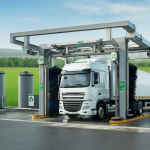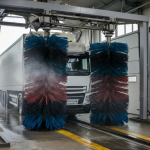Summary
The truck wash business is a growing niche within the vehicle maintenance industry, driven by the increasing demand from logistics and transportation. Revenue potential is promising, with single truck washes priced between $40 and $100, specialized services starting at $150, and lucrative fleet contracts generating tens of thousands of dollars monthly. Annual revenues range from $200,000 to over $1 million depending on location, scale, and services offered.
However, starting a truck wash requires a significant upfront investment, with land, equipment, and construction costs totaling $350,000 to over $1 million. Operational expenses include labor ($40,000–$100,000 yearly), utilities ($20,000–$50,000), cleaning supplies ($10,000–$25,000), and maintenance. Profit margins typically range from 10% to 20%.
Key factors influencing profitability include location (preferably near highways or industrial areas), service offerings (such as fleet contracts and premium packages), technology adoption (automation reduces costs), and customer experience. Strategies to increase revenue include offering subscription plans, expanding services, focusing on marketing, forming partnerships with fleet managers, and ensuring excellent customer service.
The truck wash industry is expected to grow in line with logistics, with opportunities to stand out through sustainable practices and advanced cleaning solutions for next-gen trucks. With the right approach, this niche offers attractive returns on investment.
Table of Contents
The world of vehicle maintenance is vast, and one specific niche that has been steadily growing is the truck wash industry. Trucks serve as the backbone of logistics, tirelessly hauling goods across cities, states, and even countries. With the wear and tear they endure, maintaining them in pristine condition is essential—not just for aesthetics, but also for safety, efficiency, and longevity.
This leads to the question on many investors’ minds: How much does a truck wash make? If you’re considering investing in a truck wash business, this blog will provide a comprehensive breakdown of revenue potential, costs, and profitability, along with actionable tips to boost earnings.
Overview of the Truck Wash Industry
The truck wash industry operates at the crossroads of vehicle maintenance and logistics, catering to a growing demand. With the transportation and logistics sectors expanding due to the surge in online shopping and global trade, fleets of trucks are clocking more miles than ever. These trucks require regular cleaning to remove dirt, debris, and contaminants that could damage vehicles or impact their professional appearance.
Truck washes service a variety of customers:
- Independent Truckers who need quick washes en route.
- Fleet Owners who require regular cleaning to maintain their large fleets.
- Specialized Trucks, including oil tankers or food-grade trailers, which must meet strict hygiene standards.
This diversity of clientele ensures a consistent customer base for businesses operating in this space.
Average Revenue of a Truck Wash
A truck wash business has multiple revenue streams, contributing to its earning potential:
- Standard Washes range from $40 to $100 for a single truck.
- Specialized Cleaning Services (e.g., deep cleaning, detailing, or degreasing) can cost $150 or more.
- Fleet Contracts, where businesses service dozens or even hundreds of trucks for a monthly fee, can generate significant recurring income. These contracts often bring in tens of thousands of dollars per month.
The average revenue of a truck wash varies based on location, scale, and services. A small, independently owned truck wash might generate around $200,000 to $300,000 annually, while larger operations with multiple bays and service options can bring in upwards of $1 million per year.
Costs Associated with Running a Truck Wash
While revenue potential may seem enticing, it’s essential to understand the expenses involved in running a truck wash. Here are some key cost considerations:
1. Initial Startup Costs
Launching a truck wash entails significant upfront investment, including:
- Land acquisition or lease ($100,000–$500,000, depending on location and size).
- Equipment like high-pressure washers, water reclaim systems, and soap dispensers ($50,000–$150,000).
- Facility construction or renovation, including building bays and drainage systems ($200,000–$700,000).
2. Operational Costs
Ongoing costs include:
- Labor (e.g., skilled workers and attendants): Many truck washes require multiple employees per shift. Labor costs can range from $40,000 to $100,000 annually, depending on the operation’s size.
- Water and Utilities: Washing large trucks consumes significant water and electricity. Most truck washes spend $20,000–$50,000 annually on utilities.
- Cleaning Supplies (soap, degreasers, waxes): Costs can total around $10,000–$25,000 annually.
- Equipment Maintenance to ensure longevity and uptime.
3. Marketing and Overheads
To attract and retain customers, ongoing marketing and administrative expenses are necessary. These cost around $10,000 to $15,000 annually.
When factoring these expenses, the final profit margins typically range between 10% and 20%, depending on the efficiency and scale of operations.
Factors Affecting Profitability
Profitability in the truck wash industry is influenced by several factors. Investors should keep the following in mind when evaluating opportunities:
1. Location
A truck wash near busy highways, industrial areas, or shipping hubs ensures a steady flow of customers. However, premium locations often come with higher land or lease costs.
2. Service Offerings
Adding value-added services such as exterior polishing, interior cleaning, or fleet-wide contracts increases revenue potential.
3. Technology and Automation
Modern truck washes equipped with automated systems reduce labor costs while providing quicker, consistent service.
4. Competition
The number and quality of competing truck washes in the area impact market share. Unique service offerings or exceptional customer service can help differentiate your business.
5. Environmental Considerations
Environmental compliance is critical, particularly when dealing with wastewater. Incorporating water reclamation systems upfront may increase costs but can lead to long-term savings and support regulation adherence.
How to Increase Revenue and Profit in a Truck Wash Business
For those already operating a truck wash or considering entering the industry, several strategies can maximize profitability:
1. Offer Subscription Plans
Encourage repeat business by creating subscription or loyalty programs tailored for truck fleets or independent operators. Regular income through monthly contracts provides stability.
2. Expand Services
Diversify your offerings by adding detailing, vehicle sanitization, or premium packages with waxing and undercarriage cleaning.
3. Invest in Efficiency
Automate processes where possible to save time and labor costs. Technology investments often pay off in higher throughput and reduced errors.
4. Leverage Digital Marketing
Create an online presence with a mobile app or website, offering booking systems, service details, and promotions. Use SEO strategies to make your business easier to find online.
5. Build Relationships with Fleet Managers
Reach out to logistics companies and offer discounts or tailored plans for maintaining their fleet vehicles. Long-term partnerships with large clients can ensure steady revenue streams.
6. Focus on Customer Experience
Customers who receive excellent service are more likely to return. Train your staff to provide friendly and efficient service, ensuring satisfaction each time.
Future Outlook of the Truck Wash Industry
The truck wash industry is expected to grow in conjunction with the logistics sector. With electric and autonomous trucks on the horizon, opportunities may emerge for businesses providing specialized cleaning solutions tailored to these next-gen vehicles.
Furthermore, as environmental regulations tighten, truck washes that prioritize sustainable practices will likely stand out. Incorporating environmentally friendly equipment and offerings can turn compliance into a competitive advantage.
Final Takeaway
Investing in a truck wash can be a profitable venture if approached strategically. By understanding the average revenue, managing costs effectively, and focusing on customer satisfaction and innovation, you can establish a successful operation in this niche.
Want to deep-dive further into the numbers or need more ideas to make your investment thrive? Subscribe to our newsletter for the latest tips and industry insights!




